Unit 12 Life is full of the unexpected Section A (1a-2c)课件38张
文档属性
| 名称 | Unit 12 Life is full of the unexpected Section A (1a-2c)课件38张 | 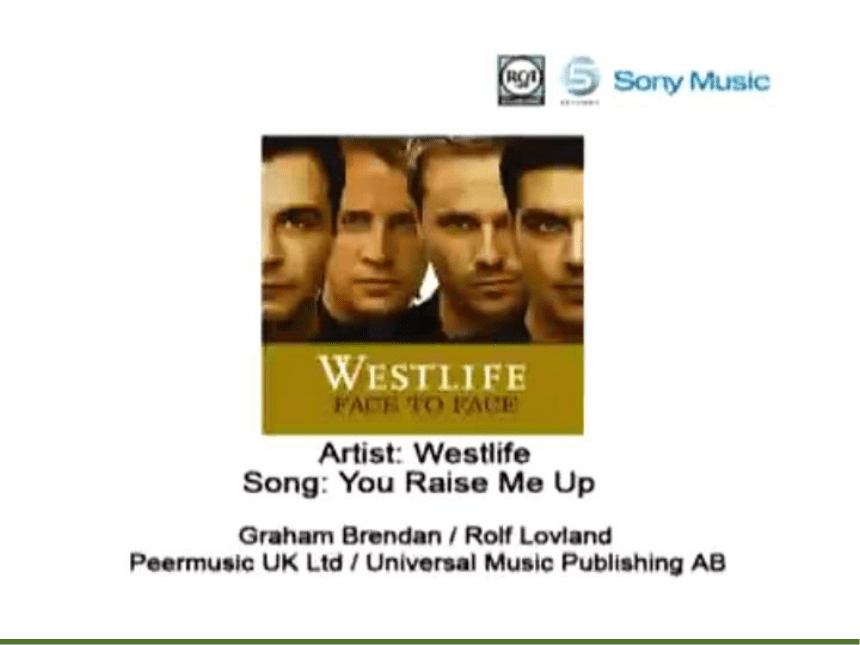 | |
| 格式 | pptx | ||
| 文件大小 | 22.5MB | ||
| 资源类型 | 教案 | ||
| 版本资源 | 人教新目标(Go for it)版 | ||
| 科目 | 英语 | ||
| 更新时间 | 2021-02-11 10:51:08 | ||
图片预览

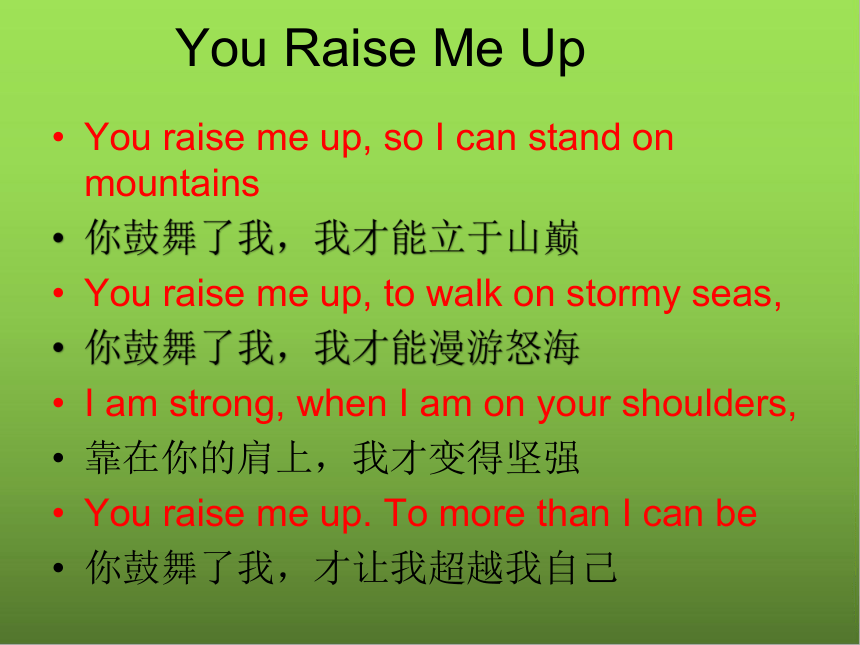
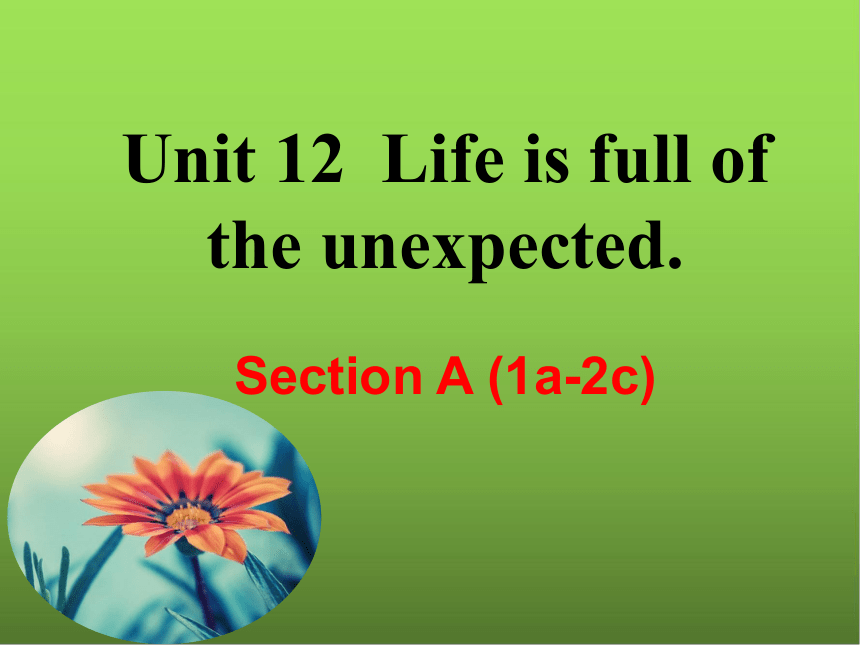
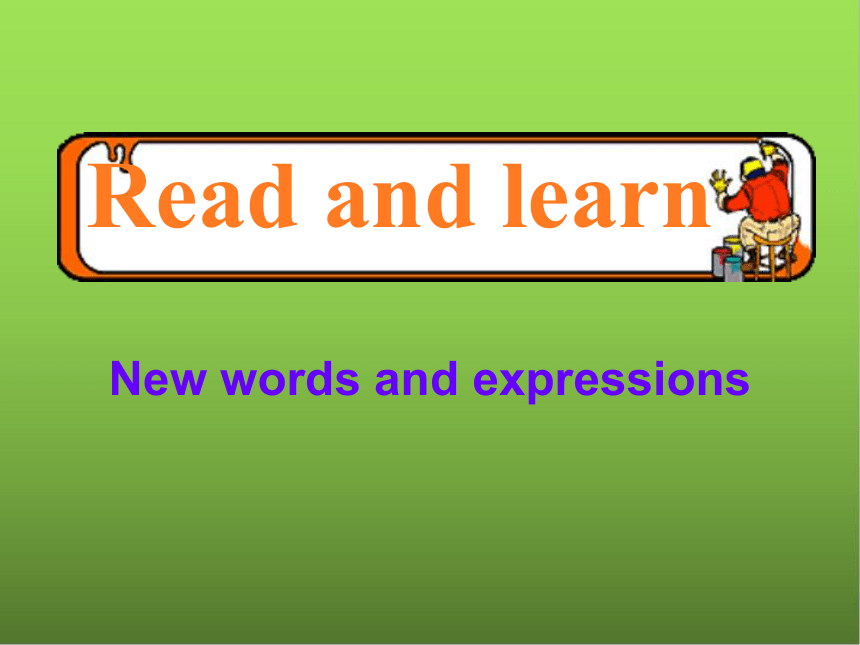
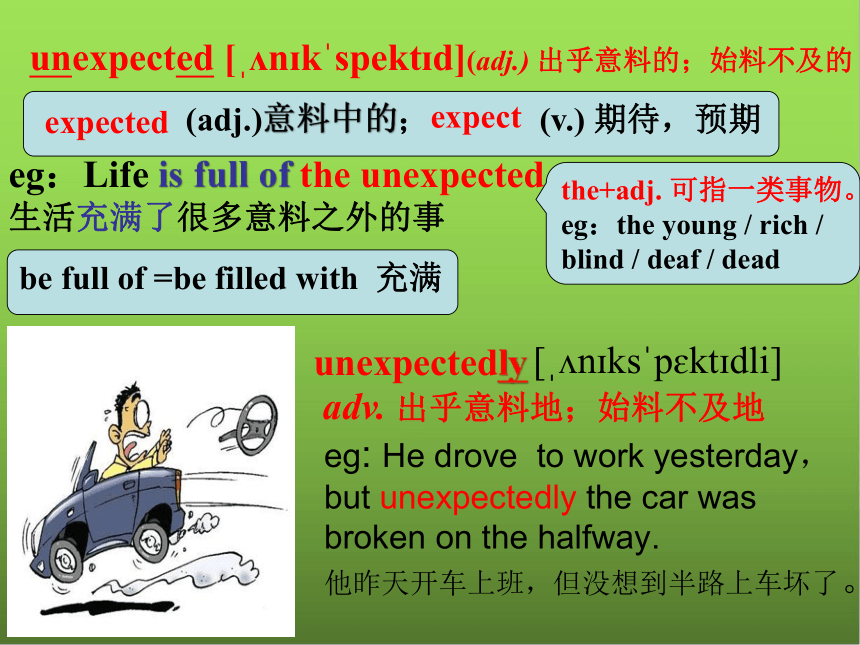
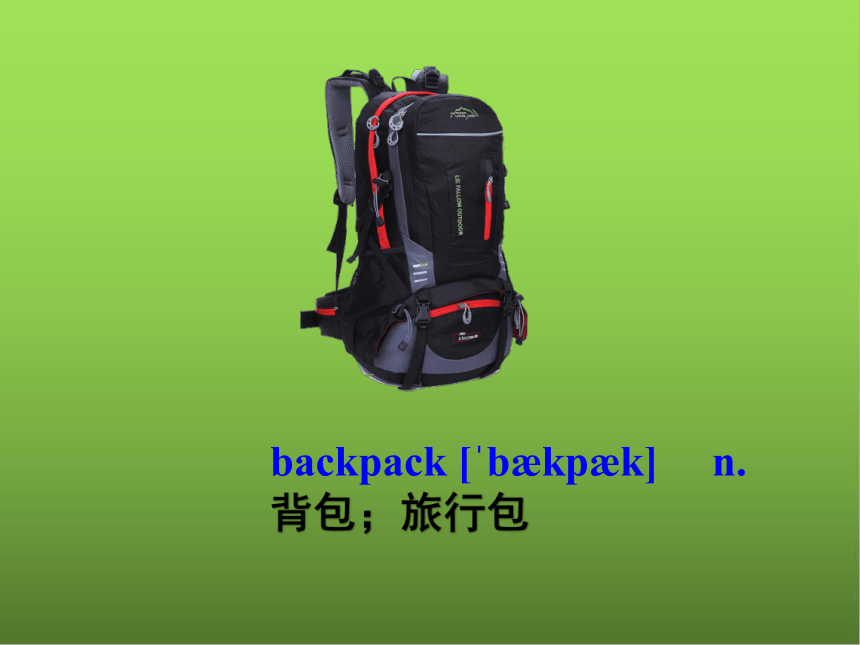
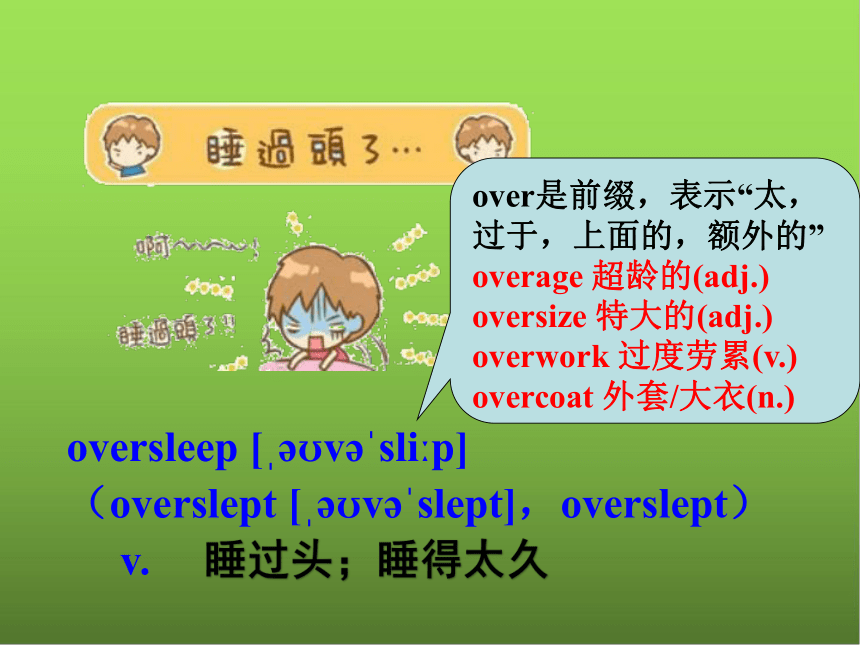
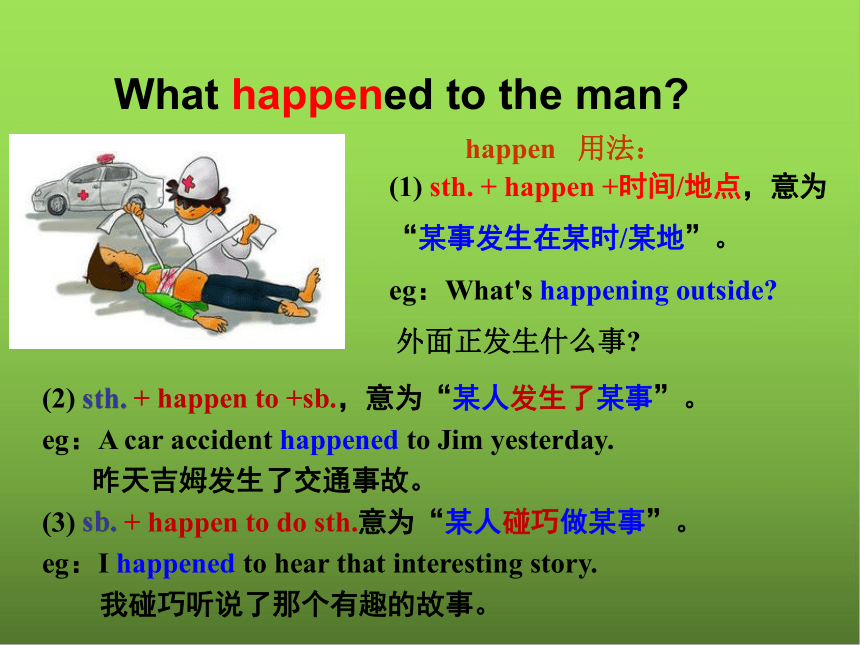


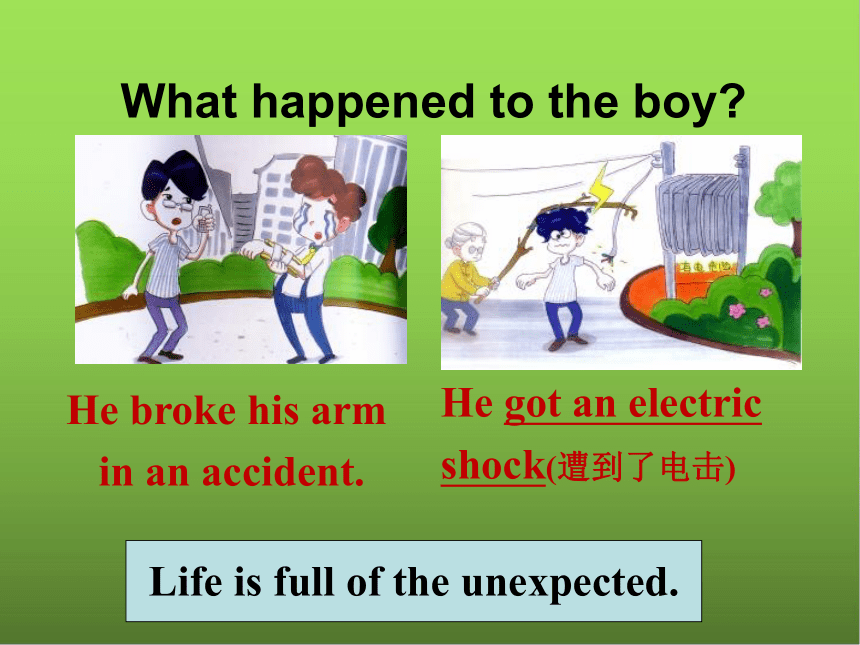
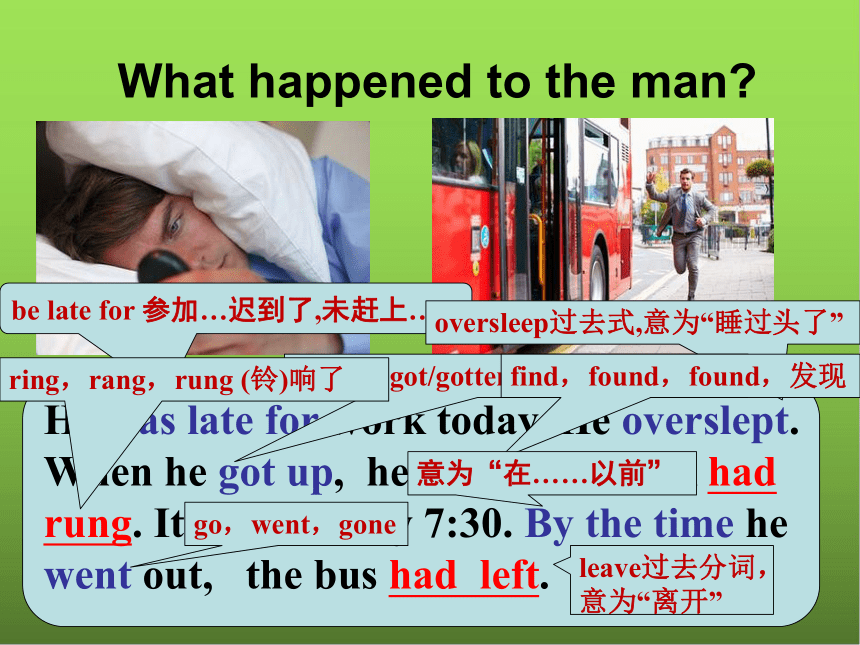
文档简介
You
Raise
Me
Up
You
raise
me
up,
so
I
can
stand
on
mountains
你鼓舞了我,我才能立于山巅
You
raise
me
up,
to
walk
on
stormy
seas,
你鼓舞了我,我才能漫游怒海
I
am
strong,
when
I
am
on
your
shoulders,
靠在你的肩上,我才变得坚强
You
raise
me
up.
To
more
than
I
can
be
你鼓舞了我,才让我超越我自己
Unit
12
Life
is
full
of
the
unexpected.
Section
A
(1a-2c)
Read
and
learn
New
words
and
expressions
unexpected
[??n?k?spekt?d](adj.)
出乎意料的;始料不及的
eg:Life
is
full
of
the
unexpected.
生活充满了很多意料之外的事
[??n?ks?p?kt?dli]
adv.
出乎意料地;始料不及地
eg:
He
drove
to
work
yesterday,but
unexpectedly
the
car
was
broken
on
the
halfway.
他昨天开车上班,但没想到半路上车坏了。
the+adj.
可指一类事物。eg:the
young
/
rich
/
blind
/
deaf
/
dead
(adj.)意料中的;
(v.)
期待,预期
be
full
of
=be
filled
with
充满
expected
expect
unexpectedly
backpack
[?b?kp?k]
n.
背包;旅行包
oversleep
[???v??sli?p]
(overslept
[???v??slept],overslept)
v.
睡过头;睡得太久
over是前缀,表示“太,过于,上面的,额外的”
overage
超龄的(adj.)
oversize
特大的(adj.)
overwork
过度劳累(v.)
overcoat
外套/大衣(n.)
happen
用法:
What
happened
to
the
man?
(1)
sth.
+
happen
+时间/地点,意为“某事发生在某时/某地”。
eg:What's
happening
outside?
外面正发生什么事?
(2)
sth.
+
happen
to
+sb.,意为“某人发生了某事”。
eg:A
car
accident
happened
to
Jim
yesterday.
昨天吉姆发生了交通事故。
(3)
sb.
+
happen
to
do
sth.意为“某人碰巧做某事”。
eg:I
happened
to
hear
that
interesting
story.
我碰巧听说了那个有趣的故事。
Lead
in
Do
you
remember
any
unexpected
situation
in
your
daily
life?
What
happened
to
the
people?
Unexpectedly
Qinkai
asked
Hezi
to
marry(和...结婚)
him
at
the
Rio
Olympics(里约奥运会)
.
What
an
unexpected
thing!
A
novel
[?n?vl]
coronavirus
[k?r?n?'va?r?s]
pneumonia
[nju??m??ni?]
(NCP)
(新型冠状病毒肺炎)
outbroke(爆发)
in
Wuhan.
COVID-19
(corona
virus
disease)冠状病毒疾病-19
He
broke
his
arm
in
an
accident.
He
got
an
electric
shock(遭到了电击)
What
happened
to
the
boy?
Life
is
full
of
the
unexpected.
He
was
late
for
work
today.
He
overslept.
When
he
got
up,
he
found
his
clock
had
rung.
It
was
already
7:30.
By
the
time
he
went
out,
the
bus
had
left.
What
happened
to
the
man?
be
late
for
参加…迟到了,未赶上…
oversleep过去式,意为“睡过头了”
get,got,
got/gotten;
get
up意为“起床”
find,found,found,发现
leave过去分词,意为“离开”
go,went,gone
意为“在……以前”
ring,rang,rung
(铃)响了
过去完成时态
概念:表示在过去某一时间或动作之前已经发生或完成了的动作或状态,它描述的动作发生在“过去的过去”。
结构:肯定句为“主语+助动词had+过去分词”;
否定句为“had
not
(hadn't)
+过去分词”;
疑问句中,把
had放到主语前面。
Language
points
现在
过去
过去的过去
过去完成时的基本用法:
①表示在过去某一时刻或动作以前完成了的动作。可以用when,by,before等介词短语或时间状语从句来表示,也可通过上下文来暗示。
如:When
I
got
up,
I
found
my
clock
had
rung.
当我起床时,我发现我的钟已经响过了。
Before
I
went
outside,
the
bus
had
already
left.
在我出来之前,公共汽车已经开走了。
I
had
finished
writing
my
composition
by
10:00
this
morning.今天上午十点以前,我已经写完了我的作文。
Language
points
②表示由过去的某一时刻开始,一直延续到过去另一时间的动作或状态,常和for,since构成的时间状语连用。
如:I
had
studied
English
for
three
years
before
I
came
to
this
school.
在我来这个学校之前,已经学习了三年英语。
Language
points
③在主从复合句中叙述过去的事。动作发生在前,用过去完成时;发生在后,用一般过去时。
如:I
returned
the
book
that
I
had
borrowed.
我归还了我借的书。
I
thought
about
what
she
had
said
before.
我考虑了一下她以前说到话。
Language
points
定语从句
宾语从句
by
the
time
by
the
time意为“在……以前”,引导时间状语从句用过去时态时,主句常用过去完成时。
如:By
the
time
he
went
out,
the
bus
had
already
left.
在他出来前,公交车已经走了
By
the
time
I
walked
into
class,
the
teacher
had
started
teaching
already.
在我走进教室前,老师已经开始上课了。
Language
points
1a
Look
at
the
pictures.
What
happened
to
the
girl?
1.
By
the
time
I
got
up,
my
brother
_____
already
_______
in
the
shower.
2.
By
the
time
I
went
outside,
the
bus
_____
already
______(leave的过去分词,1.意为“离开”).
3.
When
I
got
to
school,
I
realized(认识到)
I
_____
______
my
backpack
at
home.
1b
Listen
to
Mary
talking
about
her
plete
the
sentences.
had
gotten
had
left
had
left
2.
left是leave的过去分词,意为“遗忘,留下”,后接宾语,再接地点。
leave
sth./sb.
+
sp.
意为“把某物/人遗忘在某处”
比较:forget也意为“遗忘”,但后不接具体地点。
3.
be
left
out
被遗忘,被忽略;
4.
leave还可意为“让...处于...状态”;
5.
leave
n.
休假。
eg.:我有三天的假期。
I
have
3
days
leave/off.
=
I
have
a
three-day
holiday.
me
alone/
the
door
open
I
forgot
my
homework
at
home.
left
I
feel
left
out.我感觉被忽略了。
1c
Take
turns
being
Mary.
Look
at
the
pictures
in
1a
and
talk
about
what
happened
to
Mary
this
morning.
First
of
all(首先)
I
overslept.
By
the
time
I
got
up,
my
brother
had
already
gotten
in
the
shower.
I
had
a
bad
morning
I
took
a
quick
shower(快速洗好澡)
and
got
dressed(穿好衣服).
But
by
the
time
I
went
outside,
the
bus
had
already
left.
What
a
pain(n.痛苦)!
Missing
the
school
bus
is
a
painful(adj.痛苦的)
thing.
I
ran
all
the
way(一路上)
to
school.
But
when
I
got
to
school,
I
realized(认识到)
I
had
left
my
backpack
at
home.
No
wonder(难怪)
you
look
stressed
out(累坏了,焦虑的;
心力交瘁的;)!
2a
Listen
to
Mary
continue(继续)
her
story.
Number
the
pictures
[1-4]
in
the
correct
order.
4
3
1
2
2b
Fill
in
the
blanks
with
the
correct
forms
of
the
verbs
in
brackets.
Then
listen
again
and
check
your
answers.
1.
When
I
_______
(get)
home,
I
realized(认识到)
I
________
(leave)
my
keys
in
the
backpack.
2.
By
the
time
I
_____
(get)
back
to
school,
the
bell
_________
(ring).
3.
By
the
time
I
_______
(walk)
into
class,
the
teacher
__________
(start)
teaching
already.
got
had
left
got
had
rung
walked
had
started
2c
Make
up
an
ending
for
the
story
and
share
it
with
your
partner.
The
teacher
looked
at
Mary
and
...
was
very
angry.
He
asked
Mary
to
hand
in(上交=turn
in)
her
homework
in
the
afternoon
and
not
to
be
late
next
time.
Summary
Key
words
&
phrases:
unexpected,
backpack,
oversleep(overslept),
leave(离开;留下,遗忘,休假),
by
the
time
(+时间状语),
happen(发生;碰巧),
ring,
pain,
no
wonder,
stressed
out
Key
sentence
structure:
过去完成时态:主语+助动词had+过去分词
eg:By
the
time
I
got
up,
my
brother
had
already
gotten
in
the
shower.
Life
is
always
full
of
the
unexpected
and
enjoyable
!
Let's
enjoy
it!
1、口头作业
(Oral
work)
Talk
about
what
happened
to
Mary
this
morning
according
to
the
listening
materials
in
1b
and
2a.
2、书面作业
(Writing
work)
学练优
Unit
12
Section
A
第一课时
Homework
Thanks
for
your
listening!
Exercises
Raise
Me
Up
You
raise
me
up,
so
I
can
stand
on
mountains
你鼓舞了我,我才能立于山巅
You
raise
me
up,
to
walk
on
stormy
seas,
你鼓舞了我,我才能漫游怒海
I
am
strong,
when
I
am
on
your
shoulders,
靠在你的肩上,我才变得坚强
You
raise
me
up.
To
more
than
I
can
be
你鼓舞了我,才让我超越我自己
Unit
12
Life
is
full
of
the
unexpected.
Section
A
(1a-2c)
Read
and
learn
New
words
and
expressions
unexpected
[??n?k?spekt?d](adj.)
出乎意料的;始料不及的
eg:Life
is
full
of
the
unexpected.
生活充满了很多意料之外的事
[??n?ks?p?kt?dli]
adv.
出乎意料地;始料不及地
eg:
He
drove
to
work
yesterday,but
unexpectedly
the
car
was
broken
on
the
halfway.
他昨天开车上班,但没想到半路上车坏了。
the+adj.
可指一类事物。eg:the
young
/
rich
/
blind
/
deaf
/
dead
(adj.)意料中的;
(v.)
期待,预期
be
full
of
=be
filled
with
充满
expected
expect
unexpectedly
backpack
[?b?kp?k]
n.
背包;旅行包
oversleep
[???v??sli?p]
(overslept
[???v??slept],overslept)
v.
睡过头;睡得太久
over是前缀,表示“太,过于,上面的,额外的”
overage
超龄的(adj.)
oversize
特大的(adj.)
overwork
过度劳累(v.)
overcoat
外套/大衣(n.)
happen
用法:
What
happened
to
the
man?
(1)
sth.
+
happen
+时间/地点,意为“某事发生在某时/某地”。
eg:What's
happening
outside?
外面正发生什么事?
(2)
sth.
+
happen
to
+sb.,意为“某人发生了某事”。
eg:A
car
accident
happened
to
Jim
yesterday.
昨天吉姆发生了交通事故。
(3)
sb.
+
happen
to
do
sth.意为“某人碰巧做某事”。
eg:I
happened
to
hear
that
interesting
story.
我碰巧听说了那个有趣的故事。
Lead
in
Do
you
remember
any
unexpected
situation
in
your
daily
life?
What
happened
to
the
people?
Unexpectedly
Qinkai
asked
Hezi
to
marry(和...结婚)
him
at
the
Rio
Olympics(里约奥运会)
.
What
an
unexpected
thing!
A
novel
[?n?vl]
coronavirus
[k?r?n?'va?r?s]
pneumonia
[nju??m??ni?]
(NCP)
(新型冠状病毒肺炎)
outbroke(爆发)
in
Wuhan.
COVID-19
(corona
virus
disease)冠状病毒疾病-19
He
broke
his
arm
in
an
accident.
He
got
an
electric
shock(遭到了电击)
What
happened
to
the
boy?
Life
is
full
of
the
unexpected.
He
was
late
for
work
today.
He
overslept.
When
he
got
up,
he
found
his
clock
had
rung.
It
was
already
7:30.
By
the
time
he
went
out,
the
bus
had
left.
What
happened
to
the
man?
be
late
for
参加…迟到了,未赶上…
oversleep过去式,意为“睡过头了”
get,got,
got/gotten;
get
up意为“起床”
find,found,found,发现
leave过去分词,意为“离开”
go,went,gone
意为“在……以前”
ring,rang,rung
(铃)响了
过去完成时态
概念:表示在过去某一时间或动作之前已经发生或完成了的动作或状态,它描述的动作发生在“过去的过去”。
结构:肯定句为“主语+助动词had+过去分词”;
否定句为“had
not
(hadn't)
+过去分词”;
疑问句中,把
had放到主语前面。
Language
points
现在
过去
过去的过去
过去完成时的基本用法:
①表示在过去某一时刻或动作以前完成了的动作。可以用when,by,before等介词短语或时间状语从句来表示,也可通过上下文来暗示。
如:When
I
got
up,
I
found
my
clock
had
rung.
当我起床时,我发现我的钟已经响过了。
Before
I
went
outside,
the
bus
had
already
left.
在我出来之前,公共汽车已经开走了。
I
had
finished
writing
my
composition
by
10:00
this
morning.今天上午十点以前,我已经写完了我的作文。
Language
points
②表示由过去的某一时刻开始,一直延续到过去另一时间的动作或状态,常和for,since构成的时间状语连用。
如:I
had
studied
English
for
three
years
before
I
came
to
this
school.
在我来这个学校之前,已经学习了三年英语。
Language
points
③在主从复合句中叙述过去的事。动作发生在前,用过去完成时;发生在后,用一般过去时。
如:I
returned
the
book
that
I
had
borrowed.
我归还了我借的书。
I
thought
about
what
she
had
said
before.
我考虑了一下她以前说到话。
Language
points
定语从句
宾语从句
by
the
time
by
the
time意为“在……以前”,引导时间状语从句用过去时态时,主句常用过去完成时。
如:By
the
time
he
went
out,
the
bus
had
already
left.
在他出来前,公交车已经走了
By
the
time
I
walked
into
class,
the
teacher
had
started
teaching
already.
在我走进教室前,老师已经开始上课了。
Language
points
1a
Look
at
the
pictures.
What
happened
to
the
girl?
1.
By
the
time
I
got
up,
my
brother
_____
already
_______
in
the
shower.
2.
By
the
time
I
went
outside,
the
bus
_____
already
______(leave的过去分词,1.意为“离开”).
3.
When
I
got
to
school,
I
realized(认识到)
I
_____
______
my
backpack
at
home.
1b
Listen
to
Mary
talking
about
her
plete
the
sentences.
had
gotten
had
left
had
left
2.
left是leave的过去分词,意为“遗忘,留下”,后接宾语,再接地点。
leave
sth./sb.
+
sp.
意为“把某物/人遗忘在某处”
比较:forget也意为“遗忘”,但后不接具体地点。
3.
be
left
out
被遗忘,被忽略;
4.
leave还可意为“让...处于...状态”;
5.
leave
n.
休假。
eg.:我有三天的假期。
I
have
3
days
leave/off.
=
I
have
a
three-day
holiday.
me
alone/
the
door
open
I
forgot
my
homework
at
home.
left
I
feel
left
out.我感觉被忽略了。
1c
Take
turns
being
Mary.
Look
at
the
pictures
in
1a
and
talk
about
what
happened
to
Mary
this
morning.
First
of
all(首先)
I
overslept.
By
the
time
I
got
up,
my
brother
had
already
gotten
in
the
shower.
I
had
a
bad
morning
I
took
a
quick
shower(快速洗好澡)
and
got
dressed(穿好衣服).
But
by
the
time
I
went
outside,
the
bus
had
already
left.
What
a
pain(n.痛苦)!
Missing
the
school
bus
is
a
painful(adj.痛苦的)
thing.
I
ran
all
the
way(一路上)
to
school.
But
when
I
got
to
school,
I
realized(认识到)
I
had
left
my
backpack
at
home.
No
wonder(难怪)
you
look
stressed
out(累坏了,焦虑的;
心力交瘁的;)!
2a
Listen
to
Mary
continue(继续)
her
story.
Number
the
pictures
[1-4]
in
the
correct
order.
4
3
1
2
2b
Fill
in
the
blanks
with
the
correct
forms
of
the
verbs
in
brackets.
Then
listen
again
and
check
your
answers.
1.
When
I
_______
(get)
home,
I
realized(认识到)
I
________
(leave)
my
keys
in
the
backpack.
2.
By
the
time
I
_____
(get)
back
to
school,
the
bell
_________
(ring).
3.
By
the
time
I
_______
(walk)
into
class,
the
teacher
__________
(start)
teaching
already.
got
had
left
got
had
rung
walked
had
started
2c
Make
up
an
ending
for
the
story
and
share
it
with
your
partner.
The
teacher
looked
at
Mary
and
...
was
very
angry.
He
asked
Mary
to
hand
in(上交=turn
in)
her
homework
in
the
afternoon
and
not
to
be
late
next
time.
Summary
Key
words
&
phrases:
unexpected,
backpack,
oversleep(overslept),
leave(离开;留下,遗忘,休假),
by
the
time
(+时间状语),
happen(发生;碰巧),
ring,
pain,
no
wonder,
stressed
out
Key
sentence
structure:
过去完成时态:主语+助动词had+过去分词
eg:By
the
time
I
got
up,
my
brother
had
already
gotten
in
the
shower.
Life
is
always
full
of
the
unexpected
and
enjoyable
!
Let's
enjoy
it!
1、口头作业
(Oral
work)
Talk
about
what
happened
to
Mary
this
morning
according
to
the
listening
materials
in
1b
and
2a.
2、书面作业
(Writing
work)
学练优
Unit
12
Section
A
第一课时
Homework
Thanks
for
your
listening!
Exercises
同课章节目录
- Unit 1 How can we become good learners.
- Section A
- Section B
- Unit 2 I think that mooncakes are delicious!
- Section A
- Section B
- Unit 3 Could you please tell me where the restroom
- Section A
- Section B
- Unit 4 I used to be afraid of the dark.
- Section A
- Section B
- Unit 5 What are the shirts made of?
- Section A
- Section B
- Review of Units 1-5
- Unit 6 When was it invented?
- Section A
- Section B
- Unit 7 Teenagers should be allowed to choose their
- Section A
- Section B
- Unit 8 It must belong to Carla.
- Section A
- Section B
- Unit 9 I like music that I can dance to.
- Section A
- Section B
- Unit 10 You're supposed to shake hands.
- Section A
- Section B
- Review of Units 6-10
- Unit 11 Sad movies make me cry.
- Section A
- Section B
- Unit 12 Life is full of the unexpected
- Section A
- Section B
- Unit 13 We're trying to save the earth!
- Section A
- Section B
- Unit 14 I remember meeting all of you in Grade 7.
- Section A
- Section B
- Review of Units 11-14
